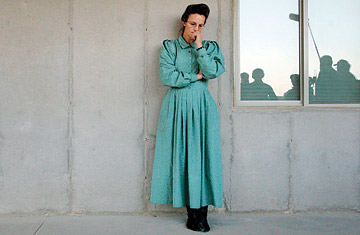
A member of the Fundamentalist Church of Jesus Christ of Latter Day Saints stands alone as others talk with members of the media, reflected in window, on the premises of the YFZ Ranch in Eldorado, Texas on April 14, 2008.
(2 of 2)
The government calls it a matter of child welfare; the sect calls it religious persecution. Caught in the middle is Texas judge Barbara Walther, who was asked to weigh requests from the parents to hold twice-daily prayer meetings with the children and to reunite nursing mothers with the 77 kids who are under age 2. Prosecutors worried that the prayer meetings might be used to influence the children "in a way to impede the ongoing investigation," but Walther's suggestion that mainstream Mormons might serve as neutral monitors was turned down flat by the official church. Church spokesman Scott Trotter told the Salt Lake Tribune that the beliefs of the FLDS long ago diverged from orthodox Mormonism and, "in fact, many in these isolated communities view us with some hostility as part of the outside world they have rejected." For the nursing mothers, the judge offered a lesson in contemporary feminism: "Every day in this country there are thousands of mothers who, after six weeks' maternity leave, must go back to work--and they deal with this issue."
Wreckage from this collision won't be tidied up anytime soon. Walther has placed her trust in the modern science of DNA--Williams was among the men who went to Eldorado to have his mouth swabbed for a sample. Mapping the intricately interwoven gene pool of the FLDS won't solve her most immediate dilemma, though. Until investigators determine what did take place on the ranch, the judge will be left in the same troubled place where she began: with a lot of mothers who love their babies, and children who miss their homes, all caught between a world they fear and a world that is unraveling.
